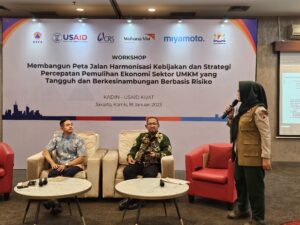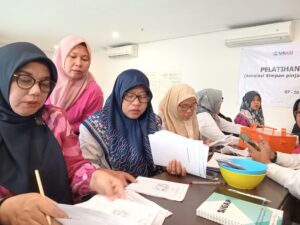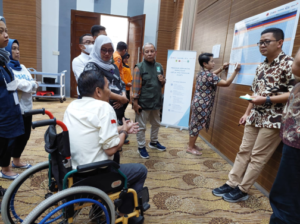USAID KUAT
USAID KUAT ACTIVITY
Komunitas Perkotaan Untuk Aksi Tangguh (KUAT)
Urban Communities for Resilient Action
CHALLENGE
Indonesia remains one of the world’s most natural disaster-prone countries with more than 56% of its population live in urban areas. DKI Jakarta has more than 10 million residents, millions more commuting to work from the nearby cities such as Tangerang and Bogor. This huge population is at significant risk from many potential disasters and the high mobility between cities creates unique challenges in mitigating these risks. There is a compelling need for holistic disaster risk reduction activities to mitigate disaster impact and build broader resilience in urban communities especially in the Greater Jakarta area.
OPPORTUNITY
With strategic investments in risk awareness, capacity building, and resilient infrastructure, urban disaster impacts can be significantly reduced. Engaging with local partners including communities, government, private sector, and civil society creates opportunities for collaborative action.
USAID KUAT ACTIVITY GOAL
To reduce the lives lost, people injured, property damaged, and overall social and economic disruption from natural disasters in Greater Jakarta, by increasing the disaster risk reduction and resilience awareness and preparedness of households and communities in high-risk urban and peri-urban villages, while boosting the capacity and coordinated engagement of local communities, civil society organizations, public and private sector actors as key partners in disaster risk reduction and resilience in Indonesia.
KEY PARTNERS
Funded by the USAID’s Bureau for Humanitarian Assistance (BHA), KUAT is implemented by a consortium of Miyamoto International, Catholic Relief Services, and Wahana Visi Indonesia that collaborates with Indonesian Chamber of Commerce (KADIN Indonesia), DKI Jakarta Disaster Management Body (BPBD), BPBD of Tangerang District, Forum PRB Jakarta, LPBI NU Jawa Barat, and Yayasan Skala Indonesia.
CORE OBJECTIVES
- Understand disaster risk in urban and peri urban villages
- Strengthen disaster risk governance to manage disaster risk
- Invest in disaster risk reduction for resilience
- Enhance disaster preparedness for effective response
KUAT strategically engages a broad range of stakeholders across Greater Jakarta, facilitating risk awareness and knowledge sharing geared toward strengthening community DRR capacity, while also developing and implementing an innovative, replicable, and collaborative ‘Whole of Settlements’ Approach to multi-hazard risk reduction in selected villages with an urban or peri-urban profile.
In KUAT’s Disaster Risk Reduction Policy and Planning sector, governments, households, communities, and businesses are engaged to enhance awareness, build capacities, and improve planning. This proactive approach reduces fatalities, displacement, and disruptions caused by natural disasters. In the Shelter and Settlements sector, the focus is on minimizing risks at the household and business levels by analyzing housing types, identifying vulnerabilities, and crafting retrofit and repair strategies. Efforts in the Economic Recovery and Market Systems sector promote financial access for community-based disaster risk reduction. Throughout the approach, KUAT will demonstrate the positive impact from involving the private sector and encouraging innovation.
IMPACT
KUAT is anticipated to empower urban communities to reduce their disaster risk through improved collaboration on preparedness, mitigation, and response resulting in the:


